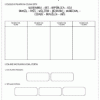
Portuguese activity, aimed at eighth grade students, explores the possessive pronouns. Are we going to analyze those terms that accompany the nouns, indicating the idea of possession? To do this, answer the questions based on the text. Knowing the gods of Brazilian indigenous mythology!
This Portuguese language activity is available for download in an editable Word template, ready to print in PDF and also the completed activity.
Download this Portuguese exercise at:
SCHOOL: DATE:
PROF: CLASS:
NAME:
Read:
Much is said about Greek and Norse mythology and even the Andean peoples, such as the Mayans, Incas and Aztecs. But what few people know is the culture that exists behind the history of our own countrymen, the Brazilian indigenous peoples, with their traditions, languages, claims and knowledge.
In addition to the Tupis and Guaranis, the Ianomâmis, Araras and dozens of other peoples also carry a deep connection with the forces of nature, which are linked to their beliefs in deities worshiped since the beginning of these civilizations. This legacy remains alive today among the more than 450,000 indigenous people who live in Brazil. It is worth knowing a little about these important entities and what they represent within the universe that resists them!
Available in:. (Fragment).
Question 1 - There is a possessive pronoun in the excerpt:
( ) “[…] history of our own countrymen […]”
( ) “[…] other peoples also carry a deep connection […]”
( ) “[…] what they represent within the universe […]”
Question 2 - In the excerpt above, the possessive pronoun refers to:
( ) to the 1st person plural
( ) to the 2nd person plural
( ) to the 3rd person plural
Question 3 - Underline the possessive pronoun that makes up this fragment:
“[…] with its traditions, languages, claims and knowledge.”
Question 4 – The underlined possessive pronoun resumes:
( ) "the Mayans, Incas and Aztecs"
( ) "few people"
( ) “the Brazilian indigenous peoples”
Question 5 - Possessive pronouns syntactically perform the function of:
( ) determine a noun.
( ) characterize a noun.
( ) complement a noun.
Per Denyse Lage Fonseca – Graduated in Languages and specialist in distance education.
At answers are in the link above the header.
 report this ad
report this ad

